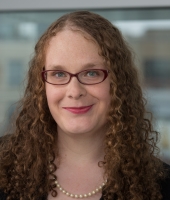Alumnus Spotlight: Olivia Hunt
June 30, 2021

Olivia Hunt (IR, Japanese ‘05) (she/her/hers)
Senior Policy Counsel, National Center for Transgender Equality
Note: Prior to her current role, Olivia served as an Equal Justice Works AmeriCorps Legal Fellow at Whitman-Walker Health in Washington, DC. She has also worked in the biotechnology industry, international election law, and municipal law.
The work you’re doing at the National Center for Transgender Equality is incredibly important, especially right now. Can you tell us a bit about what you do for transgender people?
NCTE’s mission is to advocate for changes in policies and society to increase understanding and acceptance of transgender people. Trans people face numerous structural barriers, often in the form of harassment, mistreatment, discrimination in housing, health care, employment, and education, and even violence. My colleagues and I work at the local, state, and federal level and within the private sector to promote policies that remove these barriers by simplifying the process to obtain corrected identity documents and records, easing access to affordable and effective health care, and barring discrimination across all facets of public life.
Despite progress on some fronts, the trans community still faces a number of challenges every day. What’s one thing you wish more folks understood about those challenges?
Our communities are at their strongest when all who live within them are able to participate fully and openly in day-to-day public life, including trans people. Trans people have always been part of American society, and always will be. We live in every state and territory in the country and are of all races, ethnic backgrounds, faiths, and walks of life. At least two million Americans identify as transgender and/or non-binary, and that number is constantly growing as the increasing visibility of trans people empowers and encourages those who might otherwise stay closeted to come out and live their lives openly as themselves. Laws and policies that try to push trans people out of public life will inevitably fail, and in the process will serve only to weaken the communities that we all live in.
Any takeaways from your time at JMC that you still lean on today?
The most important class I’ve ever taken in my academic career, from kindergarten through to law school, was MC 387 “Jews and Antisemitism” with Prof. Kenneth Waltzer. As a young person it opened my eyes to how bigotry becomes ingrained and institutionalized within society, and the horrors that can result from that. Even after two decades, the texts from that class still have pride of place on my bookshelf to remind me that my work should always aspire to inclusion and justice whenever possible.
Your career path has taken some fascinating turns! Are there any common threads you can identify between the expertise you’ve built in the biotechnology industry, government contracting, and even election law?
In all honesty, there aren’t that many common threads to be found, other than that it’s vital to always keep an open mind about the opportunities that come your way. The sad fact is that building a traditional career as a trans woman can be difficult in the legal field, which has many systemic biases against both women and LGBTQ+ people. The most important lesson I’ve learned from this is to make sure that once I’ve climbed up a ladder, nothing I do serves to pull it up after me. If anything I do during my career helps to erode these biases for other women and LGBTQ+ people, as well as for people of color and other marginalized groups in our society, then I can consider my career to have been successful.

